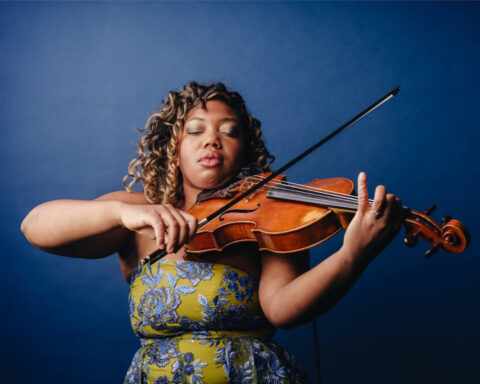In Canada, Muslim people are often spoken about, rather than the people who are doing the speaking.
It is one of the reasons the Outburst! Young Muslim Women’s Program is needed, says the program’s advisory committee chair — writer, poet, and arts and equity educator Rania El Mugammar.
The program recently launched Homebound IIII, its latest collection of Muslim women’s poetry, during its fourth annual Volume: Sisters Make Noise showcase held at Daniels Spectrum in Toronto.
Homebound is a collection of poetry written by six young women who self-identify as Muslim through spiritual, familial, ancestral, cultural or political connections. During six months, the women came together bi-weekly to share “herstories,” explains the book’s preface.
“This was a sacred place where our worlds came together, and we felt less disjointed, taking parts of each other and making a whole,” it reads.
The result: 36 pages of powerful tales exploring everything from the immigration experience to young love, carefully crafted in various styles of poetry.
You can exist
El Mugammar says that in Muslim communities, events are often separated into the “sister side” and the “brother side.”
The sister side is taking care of children, preparing food for everyone, organizing and cleaning up. It’s not usually invited to participate. Both the book and its launch — an evening of spoken word, poetry, and musical performances by Muslim women — represent something that is lacking.
“I think it’s critical to just carve out space and say this is just for us . . . this is our space,” explains El Mugammar, who performed at all four editions of Sisters Make Noise and mentored many of the current and past contributors to Homebound.
“This was a sacred place where our worlds came together, and we felt less disjointed, taking parts of each other and making a whole.”
Resilience and strength in the face of adversity are common threads found throughout Homebound. In her poem, “choose you,” Urooj (MC Shahzadi) writes:
Even in this damned society you can exist,
Blessed with experiences filled of heavenly bliss,
Take the hardest moments as a reminder to choose,
The choice towards a destiny only determined by you.
In the book’s preface, Outburst facilitators Jamila-Khanom Allidina, Rosina Kazi, and Shameela Zaman reflect on this verse, writing, “Not only do we exist, we fight, we laugh, we write and centuries of Muslim women’s resilience is celebrated and remembered. Even if it’s just to remind ourselves: we are powerful, breathtaking and brilliant.”
Fighting to claim stories
El Mugammar says she likes to tell stories of the people in her life, primarily Sudanese women. These stories, she says, are missing from the very public, “Google-and-find-it” type of mainstream historical documentation.
“Our day-to-day lives, they often get lost,” she says. “I don’t want the women that I know helped shape me to be the person that I am today to be forgotten.”
These daily experiences are creatively woven throughout Homebound.
In “skype-shype,” Reema Kureishy captures what it’s like to video chat with her grandparents in her native country, India, effectively detailing their minimal understanding of how to work with technology and the endless promises of “coming home” thrown back and forth.
“I think it’s critical to just carve out space and say this is just for us . . . this is our space,” explains El Mugammar.
In “thoughts in a waiting room,” Seema (who goes only by her first name) offers a story about the agonizing pain of finding out if a parent has cancer.
In the book’s opening piece “jung,” Kureishy writes about the fight “to claim not land, but our stories.”
As El Mugammar points out, these stories are important for everyone, not just Muslim women, to listen to and read.
“A lot of people…who may not identify with that identity of being a young, Muslim woman… can identify with a lot of the feelings, a lot of the kinds of stories that we tell.”
I am real…
El Mugammar says that Outburst allows racialized women like herself to be showcased as more than one-dimensional.
She explains that while she has often relied on writing to release some of the anger she feels about the social injustices and oppression she experiences, she is more than the “angry, Black woman” people are quick to label her as.
“I’m also funny and smart and a whole lot of other things,” she says, adding that the Outburst program allows participants to explore the multi-faceted aspects of their personalities, experiences, and community’s stories.
Resilience and strength in the face of adversity are common threads found throughout Homebound.
Dumo, an Outburst alumni and co-host of the Sisters Make Noise event, exemplifies this multi-faceted experience in her high-energy monologues. One is about her mother interrupting her Dragon Ball Z episodes to cart her off to Qur’an lessons, another about convincing her Muslim parents to allow her to participate in the school Christmas concert.
As another woman of East African descent, El Mugammar says that while watching Dumo, she felt a strong sense of connection.
“There was a young girl,” she begins, referring to 11-year-old Marley Dias of the United States, “who started a Black girls’ book club because she was tired of reading about ‘white boys and dogs’ and in a lot of ways, I feel the same. It’s always nice to get the kind of humour and the kinds of stories that are absolutely relevant to my life.”





